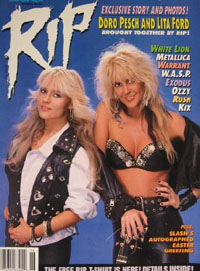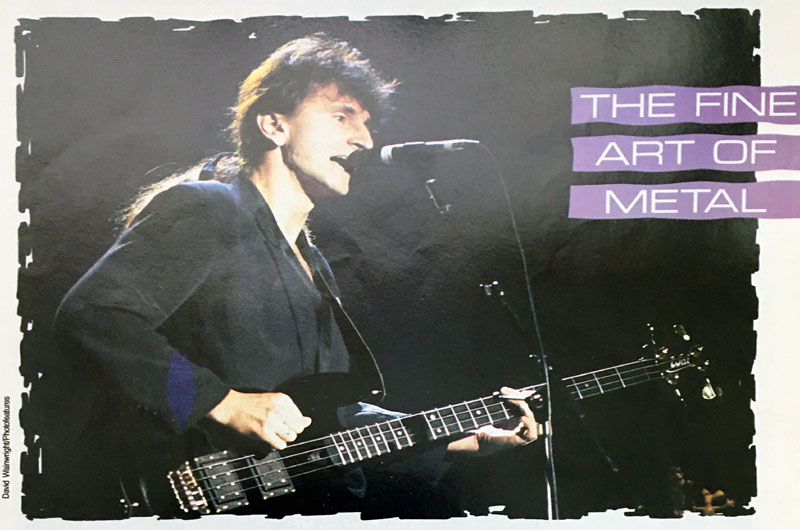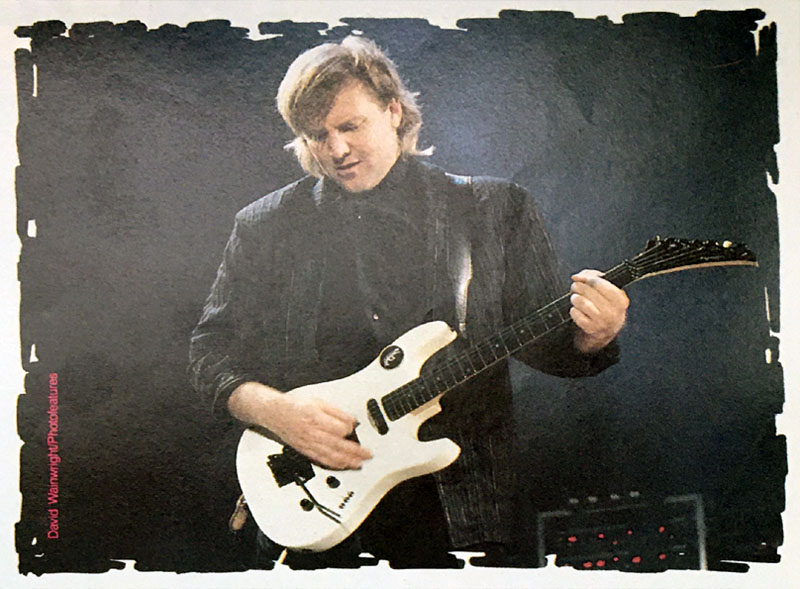Rush: The Fine Art Of Metal
By Anne Leighton, RIP, June 1989, transcribed by Mark Walton

"Ewww, they're so ugly!" one groupie-wanna-be journalist squealed when asked why she wasn't doing an article on Rush. "They've got an attitude problem," was the reason another mogul, er, writer wasn't writing about the band and the release of their new double live album, Show of Hands.
It's hard to believe any writer would turn down an assignment to interview Rush. They, plus Kiss, Ted Nugent, Van Halen, Aerosmith, AC/DC and Blue Oyster Cult, were one of the big bands of the second generation of heavy metal. Rush was a perfect combination of hard metallic sounds, progressive rhythms and mystic lyrics. And they still make valid hard-rock music. Plus, their styles have influenced the third and fourth generation of metal disciples, such as Fates Warning, Stryper and, most notably of late, Dream Theater.
Granted, Geddy Lee ain't exactly young-looking, like beautiful Bret Michaels, but he's in fine shape for his bone structure, and he's got the young boy in his high-pitched singing voice. And guitarist/keyboardist Alex Lifeson, with his yuppie hairstyle, may look more like Ron Howard than a rock star, but he sure can shred. Neil Peart - the darkness that haunts his face also haunts his lyrics.
Perhaps, because Rush has been around for so long, it's easy for the music press to cast them aside as old news. And Rush hasn't made it easy on themselves. They aren't trying to be the hippest metal band around. One reason is natural: age. And secondly, the group hasn't stuck to its metal roots. In 1973, when they first started, they were into Led Zeppelin. Since then they've enjoyed different rhythms and sounds. Eight years ago they were inspired by the ethnic dabblings of new-wave artists such as the Police and Talking Heads. Now Geddy is fascinated by the sound of pianos. Will that be on their next record? Who knows. One guarantee is there'll be lots of loudness on it, 'cause there always have been metal clangs on Rush records.
Geddy's not surprised by the press snub. "Our sound has changed so much over the years. There are so many influences. It's very difficult to label us by what sound we have now. It has something in common with Metallica's style, but even that is so far removed from us.
"It's funny. When you talk to metal people about Rush, eight out of ten will tell you that we're not a metal band. But if you talk to anyone outside of metal, eight out of ten will tell you we are a metal band. Metal is a very broad term. I've always preferred the term rock. I've always associated metal with a darker side, which we have had in our career. But if you have to label us, hard rock suits us better. It's not as limiting as metal, especially if you label it progressive hard rock."

With a focused attitude toward making music, the guys get together to swap ideas. A few years ago Neil went to Geddy's house, and they shared what they were creating on their own for Rush. Geddy couldn't relate to some of Neil's lyrics. "Then we had to discuss what was going down," Geddy says. "We have to do that with the songs. Sometimes I have to make sure that I agree, at least in part, with what's being said. If I don't feel like I have any conviction about what's being said, I have to try and understand if Neil is intending that song to sound the way I'm getting it. If he's not getting what he's intending to say across to me, he's certainly not going to get it across to outside people." With all the possible ways for Neil's songs to be stretched, he and Geddy have to talk. Sometimes Neil will come up with a workable solution for the lyrics, and Geddy will like it. And sometimes Neil will be inspired to write a whole new song. "Mission" came about after one such discussion.
"We had a conversation about creativity and being obsessed," Geddy remembers. "We felt fortunate that we knew at a very young age what we wanted to do with our lives. We were obsessed by music. We didn't have to make the choice later in life that many of our friends had to. They're probably qualified to do ten more things, but they had to decide on one thing. And their lives are in a sort of turmoil. So that led to the song."
I mention that on "Mission", "Closer to the Heart" and "Subdivisions" Geddy sounded like a young boy. "Sometimes I am a young boy when I sing," he says. "Those songs all have a personal connection with my youth experiences, and maybe that's the key to why those vocals have that quality. Those songs are born out of our influences. They're about being young, growing up, having young aspirations and being obsessed at a young age - which I was. Your attitude is borne by what the song means to you. That's the attitude that you can bring to the song as a vocalist."
Most people who go after their creative dreams at a young age end up achieving them sooner or later. In rock and roll they become rock stars. But that existence is never what they planned it would be. "People have this idea that they know people who are in the public eye, but they don't," Geddy says. "It doesn't matter how many interviews Barbara Walters does with Paul Newman, you still don't know who he is. You can't know someone from five interviews. It's a lot more complicated situation than that." Rush exists the way it is. And for Geddy, the whole concept of trying to portray his personality is a very strange priority. "It's very distracting. The best thing is to just be and do and let your action - your music - do the talking."

But now Geddy's talking. And he feels that even the biggest Rush fan can have his or her objectivity clouded by a personal enthusiasm for the band. "When you're a fan, you're not looking at a musician from the same level. It's very hard to develop a friendship with someone if you don't feel you're on the same level. There's limitations as to how far that friendship can honestly go."
He's a fan, so he should know. Through his whole musical career he's been into bands and, more specifically, bassists - like Jack Bruce and Cream, the Who's John Entwistle, Led Zeppelin's John Paul Jones, Jimi Hendrix Experience's Noel Redding, Jack Casady of the Jefferson Airplane and Yes's Chris Squire. He's never met any of these artists and thinks it's better that way. "I think at this stage in my life I've been through that kind of thing where you admire somebody, and you end up meeting, and then you're disappointed. Of course there are times when I am in awe of certain people I really admire. But so much has to do with circumstances. If you're two people who happen to be of like personality or have something in common, then the barriers get cut down. But if there's nothing in common, then they don't."
From listening to any band's music, all the fan can really hear is if they're good songwriters and what the band wants to tell the public through their lyrics. This is especially true with Rush, because Geddy's not going to showcase his eight-year-old son or his love of baseball. "That's the reason why there are all these magazines around," says Geddy. "People want to know about the people they admire or the people who have notoriety for a lot of reasons. They are genuinely interested in what makes these people tick, because they can apply it to their lives. And the other thing is, people love the gossip - the more the merrier. It's something to talk about."
But Geddy Lee and the rest of Rush prefer the way taken by more serious artists throughout history. They let the work speak for itself. And speak it does...